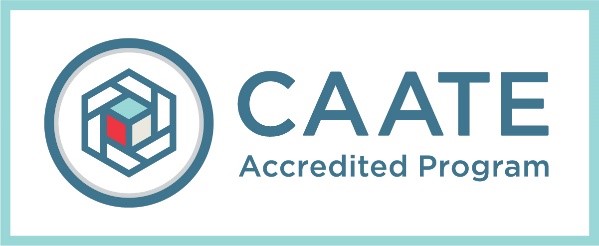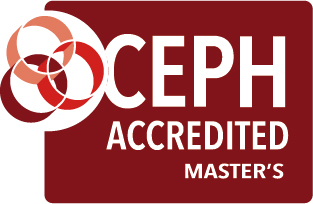Accreditation
About HHS
Earning Industry Recognition
Because we strive for our programs to comply with the highest industry standards, many undergraduate and graduate programs in the College of Health and Human Sciences have received specialized accreditation from professional organizations. These accreditations ensure you will receive a top-quality education that aligns with workforce needs.
Explore accreditation within our departments and schools below.
Accreditation by Departments and Schools
Health and Kinesiology
Athletic Training Education Graduate Program
Purdue University is currently accredited by the Commission on Accreditation of Athletic Training Education (CAATE), 2001 K Street NW, Third Floor North, Washington DC 20006. The program is applying to the CAATE for a substative change in level of degree.

In compliance with U.S. Department of Education regulations 34 CFR 668.43 (a) (5) (v) and 34 CFR 668.43 (c) the Purdue Athletic Training program acknowledges the curriculum meets educational requirements for the Board of Certification (BOC) examination, recognized as the required examination for professional regulation in all states. California does not currently regulate the Athletic Training profession.
Health Sciences
Medical Physics Graduate Program
The Purdue medical physics program is CAMPEP-accredited. The required CAMPEP reports can be found on the Medical Physics webpage under Program Statistics.
Occupational and Environmental Health Sciences
Both the Purdue University undergraduate and master’s Occupational and Environmental Health Sciences programs are accredited by the Applied Science Accreditation Commission of ABET, https://www.abet.org.
Mission
The mission of the undergraduate program in Occupational and Environmental Health Sciences is to prepare its graduates to become professionals in Industrial Hygiene and related fields. Such professionals will be competent, effective and ethical in applying scientific principles to protect workers from the adverse effects of environmental agents and workplace stressors.
The mission of the graduate program in Occupational and Environmental Health Sciences is to prepare its graduates to be professionals, leaders and researchers in Industrial Hygiene and related fields. Such professionals will be highly competent, effective and ethical in applying scientific principles to carrying out activities to protect workers from the adverse effects of hazardous environmental agents and workplace stressors.
Program Educational Objectives and Outcomes
The educational objectives of the Purdue University Industrial Hygiene program are to produce professionals that will be able to fulfill professional positions in Industrial and related fields, applying scientific principles and functioning competently in:
- Conducting assessments of workplace environments to determine exposures to environmental agents and workplace stressors.
- Evaluating the health risks due to exposures to environmental agents and workplace stressors
- Recommending strategies, procedures and equipment for preventing and reducing occupational health hazards.
- Communicating to workers, managers and other professionals the nature of environmental exposures, the health risks associated with these exposures, and methods for eliminating or minimizing these risks.
- Obtaining, organizing and analyzing environmental monitoring data and preparing a technical written report based on this data
- Carrying out their professional activities ethically.
Upon completion of our ABET accredited graduate program, our Industrial Hygienists typically assume a variety of leadership roles in academia, industry, labor and government. The usual path includes advancing from a project officer focusing on workplace or environmental hazards to global management of occupational, environmental health and safety (OEHS) programs. The graduate program has four additional educational objectives: - Develop and lead programs to identify, assess and reduce workplace hazards.
- Design and implement research studies in Industrial Hygiene and Occupational Health.
- Give scientific and technical talks to professional groups on occupational health topics.
- Write a research paper based on field studies, laboratory studies, modeling or a review of scientific literature.
Student Outcomes
The program must have documented student outcomes that prepare graduates to attain the program educational objectives. There must be a documented and effective process for the periodic review and revision of these student outcomes. Criteria for Master’s level applied science programs are inclusive of those for baccalaureate level applied science programs with the following additions: one year of study beyond the baccalaureate level and a project or research activity resulting in a report that demonstrates both the mastery of the subject matter and a high level of communication skills.
Baccalaureate (and Master of Science) degree programs must demonstrate that graduates have:
- an ability to apply knowledge of mathematics, science, and applied sciences
- an ability to design and conduct experiments, as well as to analyze and interpret data
- an ability to formulate or design a system, process, or program to meet desired needs
- an ability to function on multidisciplinary teams
- an ability to identify and solve applied science problems
- an understanding of professional and ethical responsibility
- an ability to communicate effectively
- the broad education necessary to understand the impact of solutions in a global and societal context
- a recognition of the need for and an ability to engage in life- long learning
- a knowledge of contemporary issues
- an ability to use the techniques, skills, and modern scientific and technical tools necessary for professional practice.
Annual Student Enrollment and Graduation Data
| Academic Year (AY) | Academic Year (AY) | Total Undergrad | Total Grad | BS Degrees Awarded | MS Degrees Awarded | PhD Degrees Awarded |
| 2012 | 66 | 6 | 25 | 1 | 2 | |
| 2013 | 56 | 6 | 15 | 2 | 0 | |
| 2014 | 36 | 8 | 17 | 2 | 1 | |
| 2015 | 28 | 14 | 20 | 5 | 0 | |
| 2016 | 9 | 8 | 9 | 4 | 1 | |
| 2017-2018 | 15 | 6 | 8 | 0 | 1 | |
| 2018-2019 | 8 | 7 | 2 | 0 | 1 | |
| 2019-2020 | 12 | 6 | 2 | 1 | 0 | |
| 2020-2021 | 10 | 9 | 5 | 1 | 0 | |
| (through 6/30/2022) | 2021-2022 | 7 | 11 | 3 | 1 | 1 |
Nursing
Accreditation
The nursing programs were initially accredited in the 1960s by the National League for Nursing and continued with this accrediting body until the new Commission on Collegiate Nursing Education (CCNE) was formed in the late 1990s. The baccalaureate program, accredited in 2016 by CCNE. The graduate programs were last accredited in 2024. The accreditation was approved for 10 years. The faculty believes that an external review by peers is vital to having programs of a high caliber. The self-study process requires all faculty and staff to complete a thoughtful review of where we have been and articulate a clear vision of where we are going next. (https://www.ccneaccreditation.org)
U.S. State Boards of Nursing Curricular Requirements
Nutrition Science
Accreditation
The Purdue University Didactic Program in Nutrition and Dietetics is accredited by the Accreditation Council for Education in Nutrition and Dietetics (ACEND).
120 South Riverside Plaza, Suite 2190, Chicago, IL 60606-6995
Phone: 800-877-1600, Ext. 5400
Purdue University’s Master of Science in Dietetics is accredited by the Accreditation Council for Education in Nutrition and Dietetics Academy of Nutrition and Dietetics.
120 South Riverside Plaza, Suite 2190, Chicago, IL 60606-6995
Phone: (312) 899-0040, Ext. 5400
EMail: ACEND@eatright.org
Psychological Sciences
The Clinical Program is accredited by (1) the APA CoA (Commission on Accreditation, American Psychological Association, 750 First Street, NE, Washington, DC 20002-4242, Phone: 202-336-5979), by whom it has been continuously accredited since 1948, and by (2) PCSAS (Psychological Clinical Science Accreditation System). PCSAS is an organization designed to accredit high-caliber clinical science doctoral programs. PCSAS was created in 2008 to promote superior science-centered education and training in clinical psychology, to increase the quality and quantity of clinical scientists contributing to the advancement of public health, and to enhance the scientific knowledge base for mental and behavioral health care. The Clinical Program is a member of the PCSAS Founder’s Circle.
The Clinical Program was recently accredited by PCSAS and re-accredited by APA CoA in the fall of 2018 and received full accreditation from each organization until 2028.
Student Admissions, Outcomes, and Other Data (pdf).
Clinical Program Contact: (765) 494-6977
Public Health
The Department of Public Health is a proud member of the Association of Schools and Programs in Public Health (ASPPH).
The Master of Public Health graduate program is accredited by the Council on Education for Public Health (CEPH) through July 1, 2031. Purdue launched the MPH graduate program in July 2014, and received initial accreditation for both the on-campus and online tracks in October 2015. In March 2024, the CEPH Board of Councilors acted to reaccredit the program for a seven-year term.

Speech, Language, and Hearing Sciences
The Master of Science (M.S.) education program in speech-language pathology (residential) and the Doctor of Audiology (Au.D.) education program in audiology (residential) at Purdue University is accredited by the Council on Academic Accreditation in Audiology and Speech-Language Pathology of the American Speech-Language-Hearing Association, 2200 Research Boulevard, #310, Rockville, MD 20850, 800-498-2071 or 301-296-5700.
Mission Statement
The Department of Speech, Language, and Hearing Sciences emphasizes the study of speech, language, and hearing, as well as essential functions of swallowing and balance through the lifespan. The Department provides excellence in education across undergraduate, graduate professional (MS-SLP and Au.D.), and research programs (Ph.D.). Evidence-based practice and research are central emphases of all the department’s programs. The Department embraces a state, national, and international character in its student enrollment, its reputation, and placement of its graduates. The mission of the department fits well with the missions of both the University and the College of Health and Human Sciences.
Student Outcome Data
AuD Program Completion Rate Data
| Academic Year | # Completed within Expected Time Frame | % Completed within Expected Time Frame |
| 2024-2025 | 4 | 80% |
| 2023-2024 | 7 | 100% |
| 2021-2022 | 8 | 89% |
AuD Praxis Examination Pass Rate Data
| Reporting Period | # Taking the Exam | # Passed Exam | % Passed Exam Rate |
| 2024-2025 | 4 | 4 | 100% |
| 2023-2024 | 7 | 7 | 100% |
| 2022-2023 | 7 | 7 | 100% |
SLP Program Completion Rate Data
| Period | # Completing Within Expected Time Frame | % Completing Within Expected Time Frame |
| 2024-2025 | 40 | 100% |
| 2023-2024 | 30 | 100% |
| 2022-2023 | 24 | 96% |
SLP Praxis Examination Pass Rate Data
| Reporting Period | # Taking the Exam | # Passed Exam | % Passed Exam Rate |
| 2024-2025 | 38 | 38 | 100% |
| 2023-2024 | 23 | 23 | 100% |
| 2022-2023 | 22 | 22 | 100% |